| Srl | Item |
| 1 |
ID:
146595
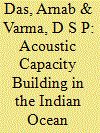

|
|
|
|
|
| Contents |
The fractured maritime mandate in India and the involvement of multiple agencies and ministries for matters maritime, make it complicated to achieve synergy. The UWR, Goa is a defence facility under the Ministry of Defence, the Ministry of Earth Science in mandated to provide R&D support for ocean related aspects, the we have the Ministry of Shipping and Ministry of Science and Technology as other players. It is known that there are close to 17 agencies and ministries of the Government of India involved in maritime issues. The huge resource and support required for UDA is possible only when all these agencies come together for a long term commitment to enhance our UDA in the IOR. A comprehensive Maritime Strategy formulation with clear focus on UDA is the only way forward to synergise the efforts of all the possible players involved. The Make in India initiative can be leveraged to contribute significantly to the Blue Economy with a clear maritime focus backed with an effective Maritime Strategy translating to enhanced Acoustic Capability in the future.
|
|
|
|
|
|
|
|
|
|
|
|
|
|
|
|
| 2 |
ID:
121086
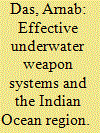

|
|
|
|
|
| Publication |
2013.
|
| Summary/Abstract |
The Indian Ocean Region (IOR) has profound strategic relevance not only for the nations in the region but also for other countries.1 The bulk of the world's merchant fleets transit through one of the busiest sea lanes in the world, via the Malacca Straits. Also, the presence of major petroleum exports originating from the Gulf, encourage the major powers of the world to have a strategic presence in the IOR. Present day naval strategies are not so much about exercising sea denial but about maintaining strategic presence, and switching to sea control whenever there is any threat to their own maritime interests. This calls for comprehensive situational awareness, and the continuous monitoring of both the surface and underwater fronts. The geographical location of India leaves it no choice but to be a major player in the IOR. Further, due to the growing energy needs of China in the recent past, and the bulk of its energy supplies transiting through the IOR, has encouraged both China and the United States to ensure their own strategic presence.
|
|
|
|
|
|
|
|
|
|
|
|
|
|
|
|
| 3 |
ID:
150593


|
|
|
|
|
| Summary/Abstract |
The maritime piracy issue drew significant global attention post-2012. The response from the major nations, even those geographically distant from the Indian Ocean Region (IOR), has been highly pro-active. Two important changes that are relevant to this paper are the increased deployment of multi-national naval forces for anti-piracy operations and also re-routing of the shipping lanes closer to the shores. The acoustic impact of these actions was completely ignored but their impact on the marine ecosystem needs to be reviewed. A rare stranding of a blue whale in June 2015 and a Bryde's whale in January 2016, off the west coast of India, are a possible manifestation of the degraded acoustic habitat due to high levels of low-frequency ambient noise in the region. The paper presents an investigative analysis of the two reported events and their correlation with acoustic habitat degradation which may be attributable to increased shipping in the region.
|
|
|
|
|
|
|
|
|
|
|
|
|
|
|
|
| 4 |
ID:
132142
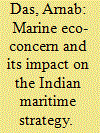

|
|
|
|
|
| Publication |
2014.
|
| Summary/Abstract |
Maritime strategic planning cannot be done in isolation of marine eco-concerns. Marine species are known to perceive the environment around them through acoustic signals, and depend on sound for numerous functions like foraging, communication and navigation. Noise as a pollutant has found scant reference in the United Nations Environmental Programme (UNEP) document of 1982-the United Nations Convention on the Laws of the Seas (UNCLOS). The International Maritime Organization (IMO) is yet to include noise as a pollutant in its 1978 MARPOL Convention. The enthusiasm for so-called economic growth and related activities in the absence of a regulatory framework encourages indiscriminate rise in such activities and the resultant increase in the anthropogenic noise, with disastrous impact on the acoustic habitat. A more inclusive maritime strategy is thus called for. In this article, the author presents a unique dimension for Indian maritime strategy.
|
|
|
|
|
|
|
|
|
|
|
|
|
|
|
|
| 5 |
ID:
115941
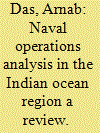

|
|
|
|
|
| Publication |
2013.
|
| Summary/Abstract |
The end of the Cold War resulted in a fundamental swing from a navy designed to engage a blue water battle fleet to one focused on forward operations in littoral waters. The Cold War era had fuelled massive research and development (R&D) in design of sonars that was able to substantially minimize the uncertainties of the underwater environment. The shift of the naval theatre to the littoral waters led to a paradigm change in terms of technology requirements to retain the effectiveness of these sonars. The underwater environment in littoral waters is significantly influenced by the local conditions and is known to be site specific. The Indian Ocean Region (IOR) is even more challenging as the shallow waters are compounded by tropical conditions. This article identifies gaps in sonar technology contributing to their ineffectiveness and presents a naval operations analysis strategy to significantly improve their performance in the IOR.
|
|
|
|
|
|
|
|
|
|
|
|
|
|
|
|
| 6 |
ID:
127140
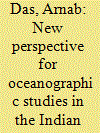

|
|
|
|
|
| Publication |
2014.
|
| Summary/Abstract |
India's location in the Indian Ocean Region (IOR) compels it to play a larger strategic role in the region. The growing energy needs of China-with the Gulf continuing to be its most preferred source-further causes the Chinese merchant fleet to transit the IOR. To ensure uninterrupted supply of energy resource, the Chinese have started to increase their presence in the region and this has, in turn, encouraged the Americans to also deploy their marine assets in the region. Keeping this in mind, for India, the emerging maritime concept of sea control requires enhanced situational awareness in the region to ensure sea denial when required.Technology has a significant role to play in such a situation and, effective sonar deployment, thus, becomes an inescapable requirement.
|
|
|
|
|
|
|
|
|
|
|
|
|
|
|
|